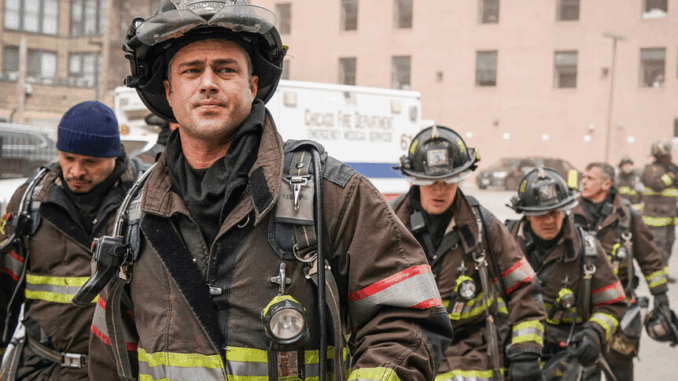
In one of the most emotional and pivotal episodes of the series, Chicago Fire Season 14, Episode 4, “Mercy,” struck a devastating blow to one of Firehouse 51’s most beloved figures, Christopher Herrmann (David Eigenberg). The crisis was intensely personal: a massive fire that destroyed his family home. The episode forced the veteran firefighter to confront his worst professional nightmare as a terrifying personal reality.
Actor David Eigenberg, who has played Herrmann since the show’s beginning, offers a compelling and raw look behind the scenes, breaking down the emotional complexity of the event, the crushing guilt his character carried, and why that house fire is far more than just a set piece. For Eigenberg, the storyline was a profound exploration of what defines “home” and the deep psychological scars left when that foundation is violently erased.
The Fear of the Call: A Professional Nightmare Made Real
For every firefighter, responding to a call at a fellow crew member’s address is gut-wrenching. For Herrmann, hearing his own address over the radio shattered the professional barrier he spent decades building. Eigenberg emphasized the immediate, primal fear that drove his character’s desperate, reckless actions.
“That moment of hearing your own street, your own number—it turns off the training, it turns off the chief’s command, everything. All that remains is the father,” Eigenberg explained. “Herrmann is a guy who runs into danger for others. To run into danger for his own child, believing Annabelle was inside, that’s a different kind of terror. You saw the total erosion of the firefighter and the emergence of the panicked parent.”
The actor lauded the script’s handling of this initial, chaotic fear, noting the brilliant moment of relief when Cindy arrives and confirms the children are safe. Yet, even in that moment of “mercy,” the tragedy remains. “He’s saved his family, but he’s lost his history. He has to stand there and watch his whole life, his memories, go up in smoke. It’s a cruel trade-off.”
The Weight of Guilt: “The Fire Was My Fault”
The emotional core of the episode hinges on Herrmann’s crippling sense of guilt. When the initial investigation hints at a faulty electrical wire that Herrmann may have installed himself, his world implodes.
Eigenberg broke down the intense pressure this placed on a character who defines himself by competence and responsibility. “Herrmann is a fixer. He’s the guy who has everything under control at home—the Molly’s, the family, the maintenance. To realize he might have been the cause of this catastrophe, that he endangered his family through his own mistake… that’s a more devastating blow than the fire itself,” Eigenberg reflected.
He described his approach to those scenes as trying to internalize that professional failure. “It’s a betrayal of his deepest code. He’s the one who lectures on fire safety, who knows all the protocols. The emotional arc of that episode wasn’t about fighting the fire, but fighting the belief that he had destroyed his family’s safety.”
“It’s Just Stuff”: Why Herrmann Snapped 🤬
One of the most talked-about moments of the episode was the explosive confrontation between Herrmann and his best friend, Mouch (Christian Stolte). When Mouch attempts to comfort Herrmann by saying, “It’s just stuff,” Herrmann’s suppressed rage erupts.
Eigenberg detailed why this seemingly simple line was the necessary catalyst for Herrmann’s breakdown. “Mouch meant well, bless his heart, but he couldn’t have said anything worse in that moment. What they lost wasn’t ‘stuff.’ It was the artifacts of their love,” the actor asserted.
Eigenberg highlighted the immense emotional significance of the lost items, particularly the doorframe with the children’s height marks and Cindy’s mother’s wedding ring.
“Think about that doorframe. Every mark is a year, a memory, a transition. You can buy new furniture; you can’t buy back a child’s growth chart. The ring, that’s not metal—that’s a lineage, a promise,” Eigenberg explained. “When Herrmann yells, he’s not yelling at Mouch; he’s yelling at the world for minimizing his trauma. He’s saying, ‘You don’t understand the years, the moments, the history that was just taken from me.’ That scene was vital to show the psychological weight of loss.”
The Power of the 51 Family and the Road to Recovery 🫂
While the fire was a tragedy, it served to reaffirm the deep, familial bonds within Firehouse 51. Eigenberg pointed to the moments of quiet support—the crew scrambling to find essentials and temporary housing—as the true heart of the show.
He reserved special praise for Kelly Severide (Taylor Kinney), whose investigation ultimately exonerated Herrmann by proving the fire was caused by a faulty appliance, not his wiring. “Severide’s actions were the ultimate act of friendship. He didn’t just investigate the fire; he investigated Herrmann’s soul and gave him back his peace of mind,” Eigenberg said.
Equally important was Mouch’s redemption, going back into the wreckage to find the wedding ring. “That ring was the only thing that could make ‘home’ feel possible again. Mouch realizing that memory was more important than comfort was a beautiful, tender moment,” Eigenberg concluded.
Looking ahead, Eigenberg revealed that the aftermath of the fire will be a long, challenging road for the Herrmann family, but one that strengthens them. They are displaced, they are struggling financially, and they have to redefine what their home looks like.
“They’re going to rebuild, but it’s going to be hard,” Eigenberg noted. “This tragedy is a story about resiliency. It’s about a man who lost his house but gained a deeper appreciation for the family—biological and chosen—who stood in the ashes with him. That’s the real story of Chicago Fire.” The devastation of their home is a major arc, but with Cindy and the kids safe, the emotional fight to establish a new normal has only just begun.